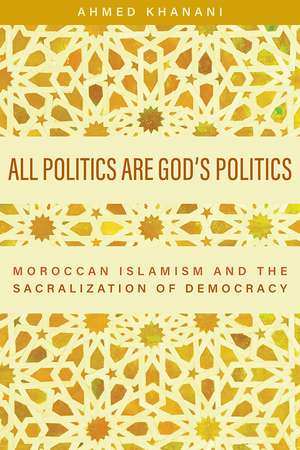All Politics Are God’s Politics: Moroccan Islamism and the Sacralization of Democracy
Autor Ahmed Khananien Limba Engleză Paperback – 15 ian 2021 – vârsta ani
Contemporary mass media descriptions of Muslims often suggest that Islam and Muslims are fundamentally undemocratic. Policy-makers in the West have weaponized these descriptions in attempts to legitimize anti-Muslim right-wing policy developments across the West and in the United States in particular, from surveillance in the aftermath of 9/11 to the anti-Islamic travel ban of 2017. But are Muslims undemocratic? Ahmed Khanani argues that this is not the case. In All Politics are God's Politics, Khanani shows that in fact, the opposite holds true: for socially conservative, politically active Muslims (Islamists), democracy or dimuqrāṭiyya reflects and extends their religious values. By drawing on conversations with over 100 Islamists in Morocco, this book enables readers to understand and appreciate the significance of dimuqrāṭiyya as a concept alongside new prospects for Islam and democracy in the Arab Middle East and North Africa (MENA). Khanani's in-depth analysis of the Moroccan case brings these Islamists and their attending political views to the forefront.
Preț: 359.13 lei
Nou
Puncte Express: 539
Preț estimativ în valută:
68.73€ • 74.63$ • 57.73£
68.73€ • 74.63$ • 57.73£
Carte indisponibilă temporar
Doresc să fiu notificat când acest titlu va fi disponibil:
Se trimite...
Preluare comenzi: 021 569.72.76
Specificații
ISBN-13: 9781978818613
ISBN-10: 1978818610
Pagini: 230
Dimensiuni: 152 x 229 x 20 mm
Greutate: 0.31 kg
Editura: Rutgers University Press
Colecția Rutgers University Press
ISBN-10: 1978818610
Pagini: 230
Dimensiuni: 152 x 229 x 20 mm
Greutate: 0.31 kg
Editura: Rutgers University Press
Colecția Rutgers University Press
Notă biografică
AHMED KHANANI is Plowshares Assistant Professor of Politics and co-director of the Center for Social Justice at Earlham College in Richmond, Indiana.
Cuprins
Contents
Note on Names
Introduction
1. Ordinary Language Philosophy and the Study of Democracy
2. islāmiyūn, Islam, Democracy
3. Institutions as Bridges
4. On Democracy and Substantive Goods
5. Democracy at Work
Epilogue
Appendix 1
Appendix 2
Glossary
Bibliography
Acknowledgments
Index
Note on Names
Introduction
1. Ordinary Language Philosophy and the Study of Democracy
2. islāmiyūn, Islam, Democracy
3. Institutions as Bridges
4. On Democracy and Substantive Goods
5. Democracy at Work
Epilogue
Appendix 1
Appendix 2
Glossary
Bibliography
Acknowledgments
Index
Recenzii
"Scholars, journalists, and politicians routinely speak of 'democracy' around the world as if the meaning of this term were universally shared. Khanani shows with great flair and sensitivity how blinding this assumption is. Highly illuminating and methodologically exemplary."
"What if to act democratically is to follow the Prophet’s sunna? This book turns the literature on 'Islam and democracy' on its head. Drawing on ordinary language philosophy Khanani explores the political-religious thought of Moroccan Muslim activists to appreciate contemporary democratic political thought and practice in an Islamic register. An extraordinary listener and innovative thinker, Khanani charts new terrain in decolonial studies, religion and politics, Islamic studies, and the study of Moroccan and MENA politics."
"Ahmed Khanani’s book is a most welcome contribution to the debate on religion and politics."
Descriere
Are Muslims in the Arab Middle East and North Africa fundamentally undemocratic? Pundits in the US often say yes, but Ahmed Khanani argues that this simplistic answer is incorrect. Instead, he shows, socially conservative, politically active Muslims value democracy or dimuqrāṭiyya as a frame that reflects and extends their religious values.
